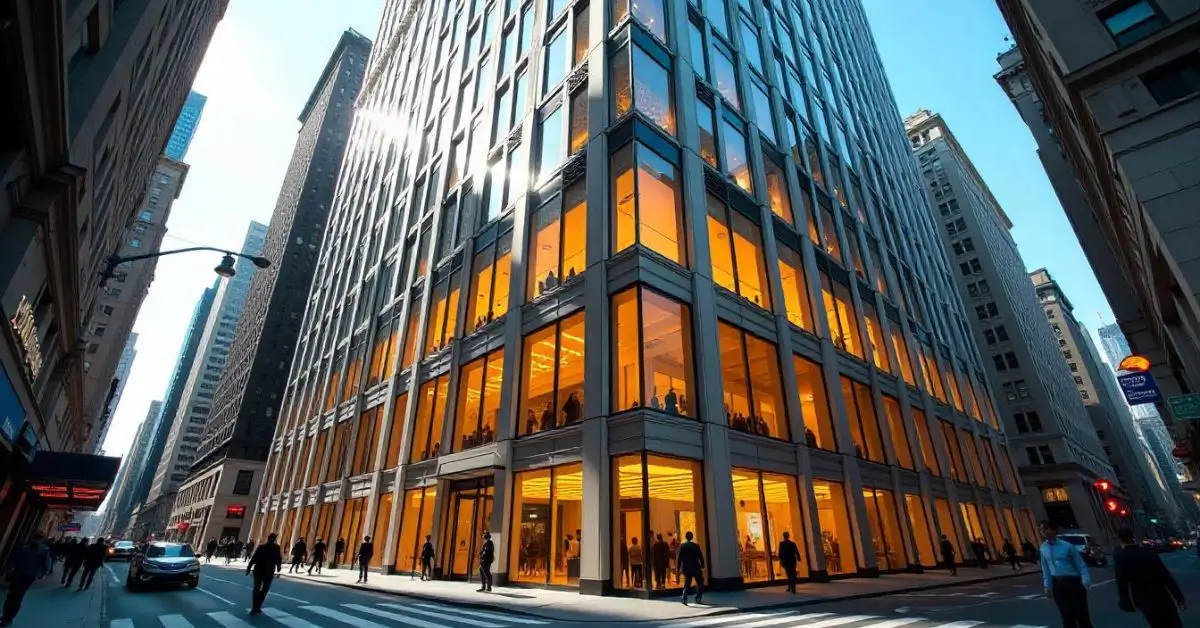EDUCATION
383 Madison Avenue New York: A Landmark of Prestige and Innovation

383 Madison Avenue New York stands as an iconic symbol of architectural brilliance and corporate excellence in the heart of Manhattan. This towering skyscraper, located in one of the world’s most prestigious business districts, has long been a hub for financial powerhouses and global enterprises. Whether you’re a real estate investor, a business professional, or simply fascinated by New York’s skyline, understanding the significance of 383 Madison Avenue offers valuable insights into its history, features, and enduring appeal.
The History and Significance of 383 Madison Avenue
Completed in 2001, 383 Madison Avenue New York was designed by the renowned architectural firm David Childs of Skidmore, Owings & Merrill. Originally built as the headquarters for Bear Stearns, the building later became a key property of JPMorgan Chase after the 2008 financial crisis. Its strategic location near Grand Central Terminal makes it a prime destination for businesses seeking accessibility and prestige.
Standing at 755 feet with 47 floors, this LEED-certified building exemplifies modern efficiency and sustainability. Its sleek glass-and-steel façade reflects the dynamism of New York’s financial district while offering state-of-the-art amenities for tenants.
Key Features of 383 Madison Avenue
1. Prime Location and Accessibility
383 Madison Avenue sits in Midtown Manhattan, surrounded by major transit hubs, luxury retail, and dining options. Its proximity to Grand Central Terminal ensures seamless connectivity for commuters and clients alike.
2. Cutting-Edge Architecture and Design
The building’s minimalist yet striking design maximizes natural light while maintaining energy efficiency. Floor-to-ceiling windows provide breathtaking city views, enhancing productivity and workplace satisfaction.
3. World-Class Amenities
Tenants enjoy high-speed elevators, advanced security systems, and flexible floor plans. The building also offers premium conference facilities, fitness centers, and on-site dining options.
4. Sustainability and LEED Certification
383 Madison Avenue incorporates eco-friendly technologies, including energy-efficient HVAC systems and water-saving fixtures, aligning with global sustainability standards.
5. Prestigious Tenant Roster
Housing major financial institutions and Fortune 500 companies, the building attracts elite businesses seeking a prestigious address.
Comparison: 383 Madison Avenue vs. Other NYC Commercial Towers
| Feature | 383 Madison Avenue | One Vanderbilt | 432 Park Avenue | 30 Rockefeller Plaza | The Chrysler Building |
|---|---|---|---|---|---|
| Height (ft) | 755 | 1,401 | 1,396 | 850 | 1,046 |
| Floors | 47 | 67 | 85 | 70 | 77 |
| LEED Certified | Yes | Yes | No | Yes | No |
| Proximity to Transit | Excellent (Grand Central) | Excellent (Grand Central) | Good | Excellent | Good |
| Notable Tenants | JPMorgan Chase | TD Bank | N/A | NBC Universal | Various |
Why Businesses Choose 383 Madison Avenue New York
For corporations seeking a blend of prestige, convenience, and modern infrastructure, 383 Madison Avenue remains a top choice. Its central location reduces commute times for employees, while its high-security standards ensure data and personnel protection. Additionally, the building’s flexible leasing options cater to both established firms and growing enterprises.
The competitive leasing rates—compared to newer supertall skyscrapers—make it an attractive option for businesses prioritizing cost efficiency without sacrificing prestige. Furthermore, its LEED certification appeals to environmentally conscious companies aiming to reduce their carbon footprint.
Future Prospects and Market Trends
As demand for premium office spaces in Manhattan continues to rise, 383 Madison Avenue New York maintains its strong market position. The shift toward hybrid work models has increased the need for adaptable workspaces, and this building’s design supports collaborative and private office configurations. Experts predict sustained interest in well-located, sustainable commercial properties, ensuring long-term value for investors and tenants.
Conclusion
383 Madison Avenue New York remains a cornerstone of Manhattan’s commercial real estate landscape. From its rich history to its forward-thinking design, the building embodies prestige, efficiency, and sustainability. Whether you’re considering leasing office space or simply admiring its architectural grandeur, 383 Madison Avenue stands as a testament to New York’s enduring it.
FAQs
What companies are located at 383 Madison Avenue?
383 Madison Avenue is primarily occupied by JPMorgan Chase, along with other financial and professional services firms. Its prestigious address attracts top-tier businesses.
How tall is 383 Madison Avenue?
The building rises 755 feet with 47 floors, making it a prominent structure in Midtown Manhattan’s skyline.
Is 383 Madison Avenue a LEED-certified building?
Yes, it holds LEED certification for its energy-efficient design and sustainable operations.
What transportation options are nearby?
Grand Central Terminal is just steps away, providing access to Metro-North, subways, and buses for seamless commuting.
Can small businesses lease space at 383 Madison Avenue?
While the building primarily houses large corporations, flexible leasing options may accommodate smaller enterprises depending on availability.
What makes 383 Madison Avenue unique?
Its combination of prime location, architectural elegance, and high-profile tenants sets it apart as a landmark of corporate excellence.
EDUCATION
What Are the Best Business Degree Careers Today?

From entry-level business jobs to high-paying business careers, this field gives you flexibility, growth potential, and skills that apply across industries. Let’s explore the career options after a business degree, the top-paying roles, and how you can turn your education into real opportunities.
Why Choose a Business Degree?
A business degree is one of the most versatile investments you can make in your future. It equips you with skills in:
- Leadership and management
- Problem-solving and decision-making
- Finance, marketing, and strategy
- Communication and teamwork
This versatility means you aren’t locked into one career path—you can pivot across industries like finance, technology, healthcare, and even entrepreneurship.
What Can You Do With a Business Degree?
Graduates often ask: “Which business degree leads to the best jobs?” The answer depends on your interests. Here are some popular business administration career paths:
- Finance & Accounting: Financial analyst, accountant, investment banker
- Marketing & Sales: Marketing manager, digital strategist, sales representative
- Management & Leadership: Business consultant, operations manager, project manager
- Human Resources: HR specialist, talent acquisition manager, training coordinator
- Entrepreneurship: Start and scale your own business
Top Entry-Level Jobs for Business Majors
If you’re just starting out, you’ll want entry-level business jobs that build experience. Some strong options include:
- Business analyst
- Marketing coordinator
- Sales associate or account manager
- Human resources assistant
- Financial advisor trainee
These positions allow you to build a foundation while learning the ropes of corporate life.
Highest-Paying Jobs With a Business Degree
If salary is a top concern, here are business degree careers that pay over $100k:
- Management consultant
- Financial manager
- Marketing director
- Data and business intelligence analyst
- Chief operations officer (COO)
Many of these roles require experience or advanced degrees (like an MBA), but they highlight the long-term earning potential of a business degree.
Business Degree Careers vs MBA Careers
You may be wondering: “Are the best careers for business degree graduates different from MBA graduates?”
- Bachelor’s in Business: Great for starting careers in management, finance, HR, or marketing.
- MBA: More advanced roles, including executive-level positions and leadership in global companies.
If you’re early in your career, start with a bachelor’s. You can always return for an MBA later to accelerate your growth.
Fastest-Growing Careers With a Business Degree
The job market is shifting, and some careers are expanding faster than others. According to current trends, the fastest-growing business careers for the next 10 years include:
- Data analytics and business intelligence
- Digital marketing and e-commerce management
- Sustainability and ESG consulting
- Healthcare business administration
- Supply chain and logistics management
Do You Need Experience for Business Careers?
A common question from students and career changers is: “Can I find careers in business without experience?”
Yes, but you’ll likely start with entry-level roles or internships. To stand out, consider:
- Internships during college
- Online certifications in digital marketing, project management, or finance
- Networking with alumni and professionals
These small steps can make you a competitive candidate even as a newcomer.
Best Online Business Degree Programs for Career Growth
For working professionals and parents, online programs are a flexible way to gain credentials. Look for accredited universities offering:
- Business administration degrees
- Specialized tracks in management, marketing, or finance
- Career services and alumni networks to support job placement
Companies That Hire Business Degree Graduates
Business degree holders are in demand across industries. Major employers include:
- Technology: Google, Microsoft, Apple
- Finance: JPMorgan Chase, Goldman Sachs, Deloitte
- Consumer Goods: Procter & Gamble, Unilever, PepsiCo
- Healthcare: Johnson & Johnson, UnitedHealth Group
- Startups & Entrepreneurship: Countless opportunities for founders and innovators
FAQ’s
Is a business degree worth it for careers in 2025?
Yes. With industries shifting toward global markets, data-driven decisions, and leadership needs, business graduates remain highly employable.
What kind of jobs do you get with a business administration degree?
Roles in management, HR, finance, marketing, and consulting are common. Business administration offers broad career flexibility.
Careers with a business management degree vs accounting degree — which is better?
- Management: Focus on leadership, strategy, and operations.
- Accounting: Specialized, stable, and great for finance-driven careers.
Your choice depends on whether you prefer leading teams or working with numbers.
Certifications to boost a business degree career?
- Project Management Professional (PMP)
- Certified Public Accountant (CPA)
- Google Analytics or Digital Marketing certifications
- SHRM for Human Resources
Final Thoughts
Business degree careers offer both flexibility and stability, making this one of the smartest academic investments. Whether you’re exploring career options after a business degree, aiming for high-paying business careers, or looking at corporate careers with a business degree, there’s a path that matches your goals.
Your future is wide open—now it’s about choosing the direction that excites you most.
EDUCATION
How to Get a Low-Interest Business Car Loan

Whether you’re a small business owner, a startup founder, a fleet manager, or even a rideshare operator, vehicles often play a vital role in running your operations efficiently. A business car loan can help you acquire the right vehicles without straining your working capital.
This guide breaks down everything you need to know about securing a business car loan in 2025—from eligibility to application tips—so you can make confident, well-informed decisions.
Why Businesses Choose Car Loans Over Upfront Purchases
Paying for vehicles outright can drain cash reserves, which are better used for scaling your business. Commercial car loans allow you to:
- Spread costs over time
- Maintain healthy cash flow
- Access tax benefits on business car loans
- Upgrade vehicles without massive upfront payments
How to Apply for a Business Car Loan in 2025
The process is straightforward but requires careful preparation.
Steps to Apply:
- Assess your needs – Determine the type, number, and specifications of vehicles.
- Research lenders – Compare business auto loan rates from banks, NBFCs, and online lenders.
- Check eligibility – Most lenders require a minimum operating history and proof of revenue.
- Gather documents – Business registration, financial statements, ID proofs, and tax returns.
- Submit application – Apply online or in-branch with a complete set of documents.
- Review offer – Compare interest rates, repayment terms, and additional charges.
Business Car Loan Eligibility Criteria for Startups & SMEs
While established companies may find it easier to qualify, startups can still access small business vehicle loans by:
- Showing strong business plans and revenue forecasts
- Providing collateral or a guarantor
- Maintaining a good personal credit score
Some lenders also offer low-interest commercial vehicle loans specifically tailored for new businesses with growth potential.
What Documents Are Needed for a Company Car Loan?
Typically, you’ll need:
- Business registration certificate
- PAN or tax identification number
- Bank statements (6–12 months)
- Profit & loss statements
- ID and address proof of directors/owners
For fleet vehicle finance, you may also need details of your existing fleet and vehicle usage plans.
Can a Business Get a Car Loan Without Collateral?
Yes. Many lenders provide company vehicle financing without collateral, especially for well-established firms with strong cash flows. However, unsecured loans may come with higher interest rates.
Business Car Loan vs Leasing — Which Is Better?
Buying with a loan:
- Ownership after repayment
- Eligible for depreciation and commercial auto loan tax deductions
- Long-term asset for the company
Leasing:
- Lower monthly payments
- No asset ownership
- Ideal for short-term or rapidly changing vehicle needs
If you want equity and tax benefits, a loan often wins. If flexibility matters more, leasing could be the smarter choice.
How to Get Low-Interest Business Auto Financing
- Maintain a strong credit score
- Shop and compare business auto loan rates from multiple lenders
- Opt for shorter loan tenures when possible
- Provide a higher down payment if feasible
Tax Benefits of a Business Car Loan in India, USA, and UK
- India: Claim depreciation and interest paid as business expenses.
- USA: Use Section 179 deduction for full or partial purchase cost.
- UK: Claim capital allowances for company cars used for business purposes.
Always consult a tax professional to maximize benefits.
FAQ’s
Best banks for small business car loans?
In India: SBI, HDFC, ICICI. In USA: Wells Fargo, Bank of America. UK: Barclays, HSBC.
Small business vehicle loan process?
Assess needs, compare offers, apply with documents, and finalize terms.
Financing a company fleet purchase?
Consider fleet-specific finance packages that offer bulk discounts and better terms.
Company car loan without down payment?
Some lenders offer 100% financing, but interest rates are typically higher.
Best lenders for business vehicle finance?
Depends on your country, but always compare 3–4 lenders before deciding.
Author Bio:
Written by Ayesha Khan, an experienced content writer specializing in finance and business topics. She holds a Master’s degree in Business Administration and has over 6 years of expertise in creating SEO-driven, reader-focused articles.
EDUCATION
Dinesh D’Souza Education: A Deep Dive Into His Academic Journey

Dinesh D’Souza’s education has played a pivotal role in shaping his career as a conservative commentator, author, and filmmaker. Known for his provocative viewpoints and intellectual rigor, D’Souza’s academic background provides critical insights into his ideological foundations. This article explores his educational journey, its influence on his work, and how it compares to other prominent thinkers.
Early Life and Academic Beginnings
Born in Mumbai, India, Dinesh D’Souza moved to the United States as an exchange student, where his academic prowess quickly became evident. He attended Arizona State University before transferring to Dartmouth College, an Ivy League institution renowned for its rigorous liberal arts program. At Dartmouth, D’Souza immersed himself in philosophy, political science, and economics—disciplines that later became central to his intellectual pursuits.
His time at Dartmouth was transformative, exposing him to conservative thought leaders and sharpening his debate skills. Additionally, his involvement with The Dartmouth Review, a conservative student newspaper, marked the beginning of his career as a political commentator.
Higher Education and Intellectual Development
After graduating from Dartmouth, D’Souza continued his education at Princeton University, where he studied public policy. His academic work focused on the intersection of politics, economics, and culture, themes that dominate his books and films today. Princeton’s elite academic environment further refined his analytical abilities, equipping him with the tools to dissect complex ideological debates.
D’Souza’s education didn’t just provide theoretical knowledge; it also instilled in him a methodical approach to argumentation. This is evident in his later works, where he meticulously deconstructs opposing viewpoints using historical and philosophical frameworks.
The Influence of Education on D’Souza’s Career
Dinesh D’Souza’s education directly influenced his transition from academia to public intellectualism. His deep understanding of political theory allowed him to craft compelling narratives that resonate with conservative audiences. Books like The Roots of Obama’s Rage and America: Imagine a World Without Her reflect his ability to synthesize academic research with accessible storytelling.
Moreover, his debates with prominent liberals often showcase his academic discipline. Unlike many pundits who rely on rhetoric, D’Souza frequently cites historical precedents, economic principles, and philosophical arguments—skills honed during his formal education.
Comparing Dinesh D’Souza’s Education to Other Thinkers
To better understand the impact of D’Souza’s education, let’s compare his academic background with other influential figures in conservative thought:
| Feature | Dinesh D’Souza | Ben Shapiro | Jordan Peterson | Thomas Sowell | Noam Chomsky |
|---|---|---|---|---|---|
| Undergraduate | Dartmouth (BA) | UCLA (BA) | University of Alberta (BA) | Harvard (BA) | University of Pennsylvania (BA) |
| Graduate | Princeton | Harvard (JD) | McGill (PhD) | University of Chicago (PhD) | MIT (PhD) |
| Key Focus | Political Theory | Constitutional Law | Psychology | Economics | Linguistics |
| Debate Style | Historical Analysis | Fast-Paced Logic | Clinical Precision | Data-Driven | Ideological Critique |
| Public Impact | Books & Films | Podcasts & Speeches | Lectures & Books | Academic Papers | Political Commentary |
This comparison highlights how D’Souza’s Ivy League education distinguishes him as a thinker who blends historical context with modern political discourse.
Criticisms and Controversies Surrounding His Academic Work
Despite his intellectual contributions, Dinesh D’Souza’s education and arguments have faced scrutiny. Critics argue that his interpretations of historical events sometimes lack nuance, while supporters counter that his ability to simplify complex ideas makes conservatism accessible.
Additionally, his legal troubles in 2014 led some to question his credibility. However, his defenders emphasize that his academic work remains analytically sound, regardless of personal controversies.
Why Dinesh D’Souza’s Education Matters Today
In an era of polarized debates, D’Souza’s academic rigor offers a model for substantive discourse. His education taught him how to engage with opposing ideas critically—a skill increasingly rare in today’s media landscape. For students and aspiring commentators, studying his approach can provide valuable lessons in constructing well-researched arguments.
Conclusion
Dinesh D’Souza’s education laid the groundwork for his influential career as a conservative thinker. From Dartmouth to Princeton, his academic journey equipped him with the tools to engage in high-stakes ideological battles. Whether one agrees with his views or not, his ability to merge scholarly research with public discourse remains undeniable.
FAQs
What degrees does Dinesh D’Souza hold?
Dinesh D’Souza earned a Bachelor of Arts from Dartmouth College and studied public policy at Princeton University, though he did not complete a graduate degree there.
How did Dartmouth influence D’Souza’s career?
Dartmouth exposed him to conservative thought and debate, shaping his ideological foundations. His work with The Dartmouth Review set the stage for his future as a political commentator.
Has D’Souza’s education been questioned by critics?
While some critics argue his interpretations are oversimplified, his academic credentials from elite institutions remain undisputed.
What subjects did D’Souza focus on in college?
He studied political science, philosophy, and economics—disciplines central to his later works.
How does D’Souza’s education compare to Ben Shapiro’s?
Both attended prestigious schools, but Shapiro’s legal training contrasts with D’Souza’s focus on political theory and history.
Did D’Souza’s legal troubles affect his intellectual credibility?
While his personal controversies sparked debate, his academic arguments continue to be evaluated on their own merits.
-

 GENERAL6 months ago
GENERAL6 months agoDoge 5000 Check: What It Is and Why It Matters
-

 ENTERTAINMENT6 months ago
ENTERTAINMENT6 months agoVirginia Tech Football News: Latest Updates, Key Insights, and Future Outlook
-

 TECHNOLOGY7 months ago
TECHNOLOGY7 months agoBroadviewNet: The Ultimate Solution for Reliable and Scalable Connectivity
-

 TECHNOLOGY8 months ago
TECHNOLOGY8 months agoSlimyim Regretevator: A Game-Changer in Adaptive Feedback Loops
-

 GENERAL6 months ago
GENERAL6 months agoCoomer Party: The Ultimate Guide to Understanding the Trend
-

 TECHNOLOGY5 months ago
TECHNOLOGY5 months agoHow a Med Tech Certificate Can Launch Your Career
-

 GENERAL7 months ago
GENERAL7 months agoAnne Dias: A Trailblazer in Finance and Philanthropy
-

 TECHNOLOGY7 months ago
TECHNOLOGY7 months agoBit Browser: The Future of Web Browsing Experience
